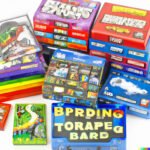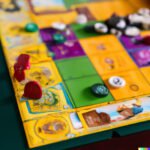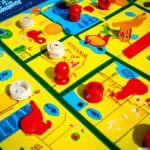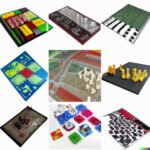Dungeon board games have been a staple in the world of tabletop gaming for decades, captivating players with their immersive fantasy settings and strategic gameplay. A key component of these classic games is the use of cards, which play a crucial role in shaping the adventure and driving the action. From character cards to item and event cards, these game elements add an extra layer of depth and excitement to the overall gaming experience.
The history of dungeon board games dates back to their origins, tracing their evolution over time and the impact they have had on the gaming industry. As these games have developed, so too have the role of cards within them, becoming an integral part of gameplay that adds complexity and intrigue to each session. By understanding the significance of classic cards in dungeon board games, players can truly appreciate their contribution to the overall experience.
In this article, we will explore the world of classic dungeon board games, delving into the history of these beloved games and examining how cards have become a defining feature. Additionally, we will take a closer look at the different types of classic dungeon board game cards, offering insights into strategies for utilizing them effectively in gameplay.
Furthermore, we will highlight notable and iconic cards from popular classic dungeon board games, as well as discussing how classic cards can enhance the overall gaming experience and add depth to gameplay. Join us on a journey through the realm of classic dungeon board games and discover how cards have continued to shape the landscape of tabletop gaming for generations.
The History of Dungeon Board Games
Dungeon board games have a long and rich history that stretches back several decades. The earliest dungeon board games can be traced back to the 1970s, with the creation of iconic games such as Dungeons & Dragons. These early games laid the groundwork for the dungeon board game genre, introducing players to the concept of exploring intricate dungeons, battling monsters, and collecting treasure. Over time, dungeon board games have evolved and diversified, with new themes, mechanics, and gameplay elements being introduced.
The 1980s saw a surge in popularity for dungeon board games, with many classic titles being released during this time. Games like HeroQuest and Talisman became beloved classics that are still enjoyed by players today. These games helped to popularize the use of cards within dungeon board games, adding an extra layer of strategy and excitement to gameplay.
As technology advanced, so did the world of dungeon board games. In recent years, we have seen a resurgence of interest in classic dungeon board games, with many fans embracing the nostalgia of these timeless titles.
Additionally, new innovations in game design and production have allowed for even more immersive and engaging experiences, making classic dungeon board games more popular than ever before. With the continued fascination with dungeon board game classic cards among both old-school players and newcomers alike, it is clear that these timeless games will continue to thrive well into the future.
- 1970s: Introduction of iconic games such as Dungeons & Dragons
- 1980s: Surge in popularity with classic titles like HeroQuest and Talisman
- Modern era: Resurgence in interest and advancements in game design
- The earliest dungeon board games can be traced back to the 1970s
- The 1980s saw a surge in popularity for dungeon board games
- In recent years, there has been a resurgence of interest in classic dungeon board games
Classic Cards in Dungeon Board Games
Classic dungeon board games are known for their immersive gameplay and strategic elements, and a key component of many of these games is the use of classic cards. These cards play a significant role in shaping the overall gaming experience and adding depth to the gameplay.
One of the main contributions of classic cards to dungeon board games is their ability to introduce variability and unpredictability. By including a wide variety of cards with different effects and abilities, players are constantly faced with new challenges and opportunities, keeping the game engaging and exciting.
Whether it’s drawing an unexpected event card that changes the course of the game or obtaining a powerful item card that gives them an advantage, the use of classic cards adds an element of surprise to each playthrough.
In addition to introducing variability, classic cards also offer players meaningful choices and strategic decision-making. Players must carefully consider when to play certain cards, how to use them to their advantage, and when to hold onto them for future opportunities. This adds a layer of complexity to the gameplay, as players must think ahead and adapt their strategies based on the cards they have at their disposal.
Furthermore, classic cards in dungeon board games often contribute to storytelling and thematic immersion. Many classic dungeon board games feature richly detailed worlds and narrative elements, and the use of character, item, and event cards helps bring these worlds to life. Through the use of descriptive text, artwork, and thematic abilities, classic cards contribute to the overall theme of the game and create a more immersive experience for players.
| Classic Dungeon Board Game Cards | Significance in Gameplay |
|---|---|
| Variability | Introduce unpredictability and new challenges |
| Strategic Decision-Making | Offer meaningful choices and add complexity to gameplay |
| Thematic Immersion | Contribute to storytelling and create an immersive experience |
Types of Classic Dungeon Board Game Cards
Classic dungeon board games are known for their intricate and immersive gameplay, often incorporating a variety of cards to enhance the overall experience. These cards play a crucial role in shaping the game dynamics and adding layers of strategy for players to navigate. In classic dungeon board games, such as “Dungeons & Dragons” or “HeroQuest,” cards are utilized to represent characters, items, and events that can dramatically impact the outcome of the game.
Character cards are an essential component of classic dungeon board games, as they provide players with unique abilities, attributes, and backstories for their in-game avatars. These cards often include vital statistics such as health points, attack strength, and special skills that can be used during gameplay. Additionally, character cards contribute to the overall narrative of the game by giving players a sense of role-playing and personalization.
Item cards hold significant value in classic dungeon board games, serving as crucial tools and resources for players to utilize throughout their quest. These cards represent various weapons, armor, magical artifacts, and other equipment that can aid characters in overcoming challenges or defeating adversaries. The acquisition and strategic use of item cards often play a pivotal role in determining the success or failure of players within the game.
Event cards add an element of unpredictability and excitement to classic dungeon board games by introducing unexpected challenges, encounters, or plot twists. These cards have the potential to alter the course of gameplay by presenting players with new obstacles or opportunities that require quick thinking and adaptability. As a result, event cards contribute to the dynamic nature of classic dungeon board games by keeping each playthrough engaging and unpredictable.
The inclusion of character, item, and event cards in classic dungeon board games not only adds depth to gameplay but also encourages creativity, teamwork, and strategic thinking among players. By exploring different types of classic dungeon board game cards and understanding their significance within gameplay, enthusiasts can gain a deeper appreciation for these beloved tabletop adventures.
| Types of Cards | Description |
|---|---|
| Character Cards | Represent in-game avatars with unique abilities and backstories |
| Item Cards | Provide weapons, armor, magical artifacts, etc. aiding characters in quests |
| Event Cards | Introduce unexpected challenges or plot twists during gameplay |
Strategies for Using Cards in Dungeon Board Games
When it comes to classic dungeon board games, cards play a crucial role in shaping the overall gameplay experience. Whether you’re delving into ancient dungeons or battling fearsome monsters, understanding how to use cards effectively can greatly enhance your chances of victory. Here are some key strategies for utilizing cards in classic dungeon board games:
1. Understand the Value of Each Card: One of the most important aspects of using cards effectively is understanding the value of each card in your hand. Character cards may provide special abilities or attributes, item cards could offer powerful weapons or tools, and event cards might introduce unexpected challenges or opportunities. Take the time to assess the potential impact of each card before making your move.
2. Build a Versatile Deck: In classic dungeon board games, having a versatile deck can significantly increase your chances of success. Including a balance of character, item, and event cards in your deck ensures that you are prepared for a variety of situations. This flexibility allows you to adapt to changing circumstances within the game.
3. Timing is Everything: Knowing when to play certain cards can be the difference between victory and defeat in classic dungeon board games. Saving powerful item cards for crucial moments, using event cards at strategic points, and employing character abilities at just the right time can turn the tide of battle in your favor.
By implementing these strategies and tactics, players can maximize the effectiveness of their cards in classic dungeon board games, adding an extra layer of skill and strategy to this beloved gaming genre.
Notable Dungeon Board Game Classic Cards
Legendary Items
One of the most iconic types of classic dungeon board game cards is the legendary item card. These cards often feature powerful weapons, armor, or magical artifacts that can turn the tide of a game in an instant.
Players eagerly anticipate drawing these cards, as they can provide a significant advantage in their quest to conquer the dungeon and emerge victorious. From the Sword of Legends to the Amulet of Eternal Fire, these legendary item cards have become synonymous with classic dungeon board game experiences.
Infamous Monsters
In many classic dungeon board games, players will encounter infamous monster cards that represent formidable adversaries within the dungeon. Whether it’s a towering dragon, a horde of undead skeletons, or a cunning goblin king, these monster cards pose a significant threat to players as they navigate through the treacherous depths of the dungeon. Defeating these monsters often yields valuable rewards, making them both feared and sought after by players.
Game-Changing Events
Another type of classic card that leaves a lasting impression on players is the game-changing event card. These cards can introduce unexpected twists and turns into the gameplay experience, presenting new challenges or opportunities for those brave enough to face them. Whether it’s a sudden trap triggering beneath your feet or a stroke of luck that leads to discovering hidden treasure, event cards keep players on their toes and injects excitement into every turn.
Overall, these notable classic dungeon board game cards have left an indelible mark on the gaming world. They are not only integral to gameplay but also serve as emblematic symbols of cherished memories shared among friends and family during epic dungeon-crawling adventures.
Enhancing Your Dungeon Board Game Experience With Classic Cards
Classic cards play a pivotal role in enhancing the overall gaming experience in dungeon board games. These cards add depth to gameplay, creating opportunities for strategic decision-making, surprise twists, and immersive storytelling. By discussing how classic cards can enhance the gaming experience, players can better understand the significance of these game elements.
Strategic Decision-Making
In classic dungeon board games, players are constantly faced with challenging decisions that can determine their success or failure in their quest. Classic cards introduce an additional layer of complexity to these decisions, as players must carefully manage their hand of cards and choose when to play them for maximum impact.
Whether it’s deploying a powerful item card at just the right moment or using an event card to thwart an opponent’s plans, classic cards require players to think critically and strategically about their next move.
Surprise Twists and Turns
Classic cards also have the potential to introduce unexpected twists and turns into the gameplay, keeping players on their toes and adding an element of unpredictability. Whether it’s drawing a character card that drastically alters a player’s abilities or encountering a game-changing event card that shifts the dynamics of the game, classic cards inject excitement and suspense into every session.
This element of surprise can make each playthrough feel fresh and dynamic, ensuring that no two games are ever quite the same.
Immersive Storytelling
One of the most compelling aspects of classic dungeon board games is the opportunity for immersive storytelling, and classic cards contribute significantly to this aspect of gameplay. Character cards provide players with unique backstories and abilities, while item and event cards can inspire imaginative narratives within the game world.
As players interact with these classic cards, they become active participants in crafting a rich and engaging story that unfolds with each turn. This storytelling element adds depth and emotional investment to the gaming experience, making it more rewarding and memorable for all involved.
The Future of Classic Cards in Dungeon Board Games
In conclusion, classic dungeon board games have had a long and storied history, with cards playing a significant role in shaping the gameplay experience. As we have traced the origins of dungeon board games and explored the evolution of classic cards within these games, it is evident that their significance cannot be understated. From character and item cards to event cards, these classic cards add depth and strategy to gameplay, making them an integral part of the overall gaming experience.
Moving forward, it is exciting to speculate on the future of classic cards in dungeon board games. With the ever-evolving world of gaming, there is potential for new innovations in card-based gameplay that could revolutionize the way players interact with these beloved classics. As game designers continue to experiment with new mechanics and technologies, we may see advancements in how cards are utilized within dungeon board games, leading to even more immersive and engaging experiences for players.
Ultimately, classic cards continue to enhance the overall dungeon board game experience by providing varied strategies and adding depth to gameplay. Whether it’s through iconic and memorable cards from popular games or through new innovations that are yet to come, it’s clear that classic cards will remain an essential component of dungeon board games for years to come.
It’s an exciting time for fans of these games as they wait to see what the future holds for classic cards in this beloved gaming genre.
Frequently Asked Questions
What Is the Board Game Where You Make a Dungeon?
The board game where you make a dungeon is called “Dungeon!.” In this game, players build and explore a dungeon while competing to collect the most treasure and escape alive.
What Is the Oldest Dungeon Game?
The oldest dungeon game is generally considered to be “Dungeons & Dragons,” which was first published in 1974. This iconic role-playing game laid the groundwork for many other dungeon-themed games that followed.
How Long Is Dungeon Board Game?
The length of a dungeon board game can vary depending on the specific game and how it is played. Some games may take around 30-60 minutes to complete, while others could last several hours, particularly if there are expansion packs or additional rules involved.

I love playing all kinds of games – from classics like Monopoly to modern favourites like Ticket to Ride.
I created this blog as a way to share my love of board games with others, and provide information on the latest releases and news in the industry.





